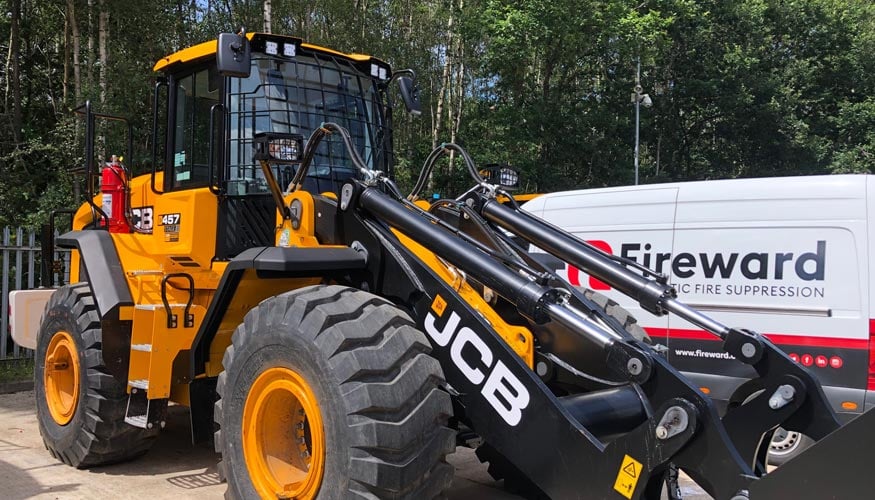-
Risky business
One of the biggest risks facing vehicles is the outbreak of a fire. It doesn’t take long for a fire to spread and gut a vehicle, rendering it beyond repair and putting the driver – as well as the public – at risk.
This can be disastrous for a business, as it means losing vehicles essential to everyday operations. Even if the vehicle can be repaired or replaced, the cost is such that it could heavily impact the finances of your business – especially if it involves downtime, delaying orders and projects company-wide.
The negative press that a fire could also draw is another reason you might want to avoid fires starting in your vehicles.

- How do vehicle fires happen
The problem is related to the formula for fire. Fuel, heat and oxygen are needed to create a fire and vehicles hold one of these in large quantities. From oils and lubricants to gasoline, there are highly flammable chemicals everywhere – these are the fuel for the fire. Vehicles also produce another side of the triangle on a regular basis: heat. So with only oxygen left, which is all around us in the air, a vehicle fire is never far away.
So now we know that the three elements of the fire triangle are readily available, what are some of the common causes of vehicles fires?
Lack of Maintenance – If you don’t keep on top of a vehicle’s maintenance you will find, eventually, something essential will deteriorate which stops the vehicle from functioning properly. Bad wiring and leaky parts are just some ways in which not taking care of a vehicle can lead to a fire.
Spilt Fuels – Whether this is the fuel used for the vehicles themselves, or flammable liquids being carried as cargo, any fuel which is spilt onto the road or internally under a vehicle’s chassis can be a recipe for disaster. Securing flammable liquids and ensuring there are no leaks in your vehicles can help reduce this risk.
Arson – Although not quite as common a cause for businesses, it’s something worth thinking about. Are your vehicles protected when unattended, and how easy would it be for someone to start a blaze using one of your vehicles? Security and standard safety procedures are a must in this instance.
Electrical Failures – There are so many electrical components to a vehicle and it only takes a single spark to ignite a fire. Special attention should be paid to your wiring on a regular basis; just as you would have your appliances and other equipment tested, so you should also test your vehicle.
-
How can I prevent vehicle fires
As we’ve already touched on, looking after your vehicles – both in terms of maintenance and security – is paramount if you want to reduce the likelihood of a fire. But that doesn’t account for the fires you have little control over, especially if you cannot see all the internal components of your vehicle.
While some vehicles will have a fire extinguisher onboard, along with fire safety procedures, this does little to help protect the vehicles themselves. With many basic industrial vehicles costing upwards of tens of thousands of pounds, it shouldn’t be hard to see why investing in better protection could save your business from ruin in the long run.
Vehicle fire suppression utilises the latest technology in fire detection and suppression for any vehicle. Extinguishing a fire in mere seconds, indirect fire suppression is ideal for vehicles, saving your assets from being ravaged whatever the cause of the fire.
-
How vehicle fire suppression works
By fitting fire suppression technology to your vehicles, you ensure that any fire is tackled immediately, undoubtedly saving lives along with the vital cogs which help your business operate.
-
A trace tube is tailored to your vehicle, which bursts to release pressure when the heat of a fire is detected
-
The pressure triggers the release of a dedicated suppressant – purposely chosen for your vehicle – through strategically placed diffusers
-
The area in which the fire arose is smothered in seconds, removing the threat and protecting the vehicle
Vehicle fire suppression is suitable for a range of vehicles, but aside from the obvious lorries, buses and cars used by companies, there are the following industrial and construction based vehicles:
-
Loading shovels
-
Material handlers
-
Skidders
-
Excavators
-
Forklifts
-
Combines
-
Tractors
-
Locomotives
This is by no means an exhaustive list, with vehicle fire suppression extending to any machinery driven and moved around by your employee behind the wheel. So whether it’s in civil engineering, or as part of the general transport network – you can have guaranteed protection against fire with a dedicated suppression system.
-
Examples
Vehicle fires don’t often hit the headlines, especially those in commercial settings, but it isn’t hard to find local news stories on vehicle fires disrupting road networks and presenting a hazard to the general public.
Take a look at the following stories, all from 2016:
Lorry Fire (Nottingham) – In early march a lorry carrying a large trailer caught ablaze at the rear of the trailer and had to be attended by four fire crews. It was not revealed how the fire started, but the incident caused a key road the be closed and will undoubtedly have had a negative impact on the business the lorry was registered to.
M56 Car Fire (Cheshire) – Causing lane closures, the seemingly spontaneous car fire sent Monday morning traffic into meltdown. The motorway is the last place you want the fire to break out, certainly, it’s a driver’s worst nightmare.
Bin Lorry Fire (Hampshire) – In April, firefighters were forced to create a dam to stop spillage of diesel and engine oil from a bin lorry. The lorry was decimated by the fire but the driver was uninjured. It took two fire engines to tackle the blaze, but nothing could be done to save the vehicle.
You can easily avoid disasters such as these through the installation of vehicle fire suppression systems. Potentially saving you tens, perhaps hundreds, of thousands of pounds, as well as protecting your drivers and staff, it really is an easy decision.
Contact Fireward today if you’d like to learn more about protecting any of your vehicles from the threat of fire. Our expert engineers are on hand to help tailor systems to your individual vehicles so that you can secure your assets and improve safety.
Fireward, Protecting People and Assets 24/7.
To find out more about how Fireward’s Automatic Fire Suppression systems, get in touch by calling 0800 151 0249 or email at: sales@fireward.co.uk


